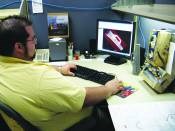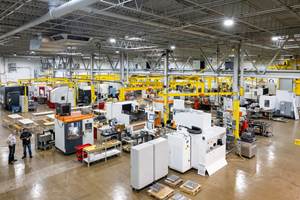Toolmakers Will All Have College Degrees
Anchor Glass Container Corporation’s Mold Division plans to stay competitive with a well educated workforce.
When Anchor Glass Container Corporation’s Mold Division needed to upgrade its capabilities for decorating the molds it produces for glass bottle manufacturing, engineers consulted with Zane State College to find out what software product was being taught in its Computerized Machine Tool Systems courses. Then the Mold Division got in touch with dealers for one product mentioned, Mastercam Art from CNC Software, Inc., as well as two others for a fast comparison.
The three Mold Division people who would be the most frequent users of mold decorating software had all received Mastercam CAD/CAM training at Zane State. They vouched for the product’s ease of use, and faculty spoke up for the ease with which technical support could be accessed. So the Mold Division purchased Mastercam without hesitation, and the company happily found itself way ahead of the learning curve.
Community, College and Customers
This example of working closely with the local community college is not an isolated case. In fact, Anchor Glass Container even has such a strong interest in college-level technical education that two of its executives serve on the Computerized Machine Tool System Program Advisory Committee, along with other representatives from the surrounding manufacturing community. These close relationships result in college-level course work that is closely tailored to the needs of the students and their likely future employers.
Anchor Glass Container Corporation is a leading manufacturer of glass containers, serving customers in the beer, food, beverage, and liquor industries. It has eight strategically located manufacturing facilities and more than 2,900 employees. Of the three corporations that provide glass containers to the food and beverage industry, Anchor Glass Container Corporation is the smallest in terms of sales volume.
“The glass industry is very competitive,” says Darren Burrow, Operations Manager for the Mold Division. “The bigger guys are always trying to gobble up your business. You have to stay ahead of the curve. We are the only ones with a company-owned central mold shop. The rest of them have to go to commercial shops. Our sister plants can lean on us to get what they need faster.”
To keep its edge, the Mold Division practices lean manufacturing, relying heavily on CNC machining cells. “Stock castings go in and a part comes out,” notes Burrow. Because of automation, the staff of moldmakers has been pared from a one-time high of 131 to 64 today, even though the work volume has held steady. “There’s no more ‘one man to one machine’,” he continues. “Each of our moldmakers is doing multiple machine operations and they are paid accordingly.”
Staying Competitive
The Mold Division has a very talented but mature workforce. One person has been with the company for 50 years, and the average age of the moldmakers is 44. Burrow anticipates that as many as eight of the moldmakers will retire within the next few years. To stay competitive it is very important to maintain the skill levels of existing and new employees through training and advanced education.
Burrow explains, “Learning to run a machine is one thing. Learning to program is another, but we want our guys to learn every aspect of manufacturing from beginning to end. That includes how various materials are made, how different things are cut, every aspect of tool design and machining processes, as well as how to write technical reports. These younger toolmakers will be exposed to a lot of things as they move through their careers, either with Anchor Glass or someone else. They need to be prepared.”
For the Mold Division, that preparation will come in the form of a college education resulting in an associate degree, at the minimum. This has been the company’s stated expectation for new employees for the past several years. The company pays for the student’s tuition and books. If two or three hours of class time happen to occur on the worker’s shift, then the student gets paid for that time.
A two-year associate degree is not necessarily the end of the line either. If the student wants to work toward a more advanced degree pertaining to his field of employment, the company will continue to provide reimbursement.
Thinking Ahead
So where is all this headed? “This plant has been around for well over 100 years,” Burrow says. “But right now, out of the journeyman moldmakers and apprentices, about 50 percent have their associate degree. In the next 7 to 10 years, everyone in here will have it. We will have a facility with 100 percent degreed skilled labor.”
Related Content
Making Quick and Easy Kaizen Work for Your Shop
Within each person is unlimited creative potential to improve shop operations.
Read MoreTackling a Mold Designer Shortage
Survey findings reveal a shortage of skilled mold designers and engineers in the moldmaking community, calling for intervention through educational programs and exploration of training alternatives while seeking input from those who have addressed the issue successfully.
Read MoreMaking Mentoring Work | MMT Chat Part 2
Three of the TK Mold and Engineering team in Romeo, Michigan join me for Part 2 of this MMT Chat on mentorship by sharing how the AMBA’s Meet a Mentor Program works, lessons learned (and applied) and the way your shop can join this effort.
Read MoreCross Training, In-House Capabilities and Collaborative Design Move Helm Tool Forward
Cross-training, bringing it all in-house, molding and collaborative design are essential to Helm Tool's success.
Read MoreRead Next
How to Use Continuing Education to Remain Competitive in Moldmaking
Continued training helps moldmakers make tooling decisions and properly use the latest cutting tool to efficiently machine high-quality molds.
Read More























